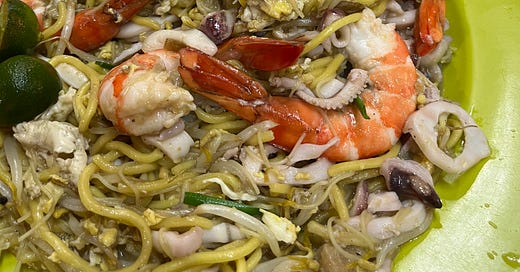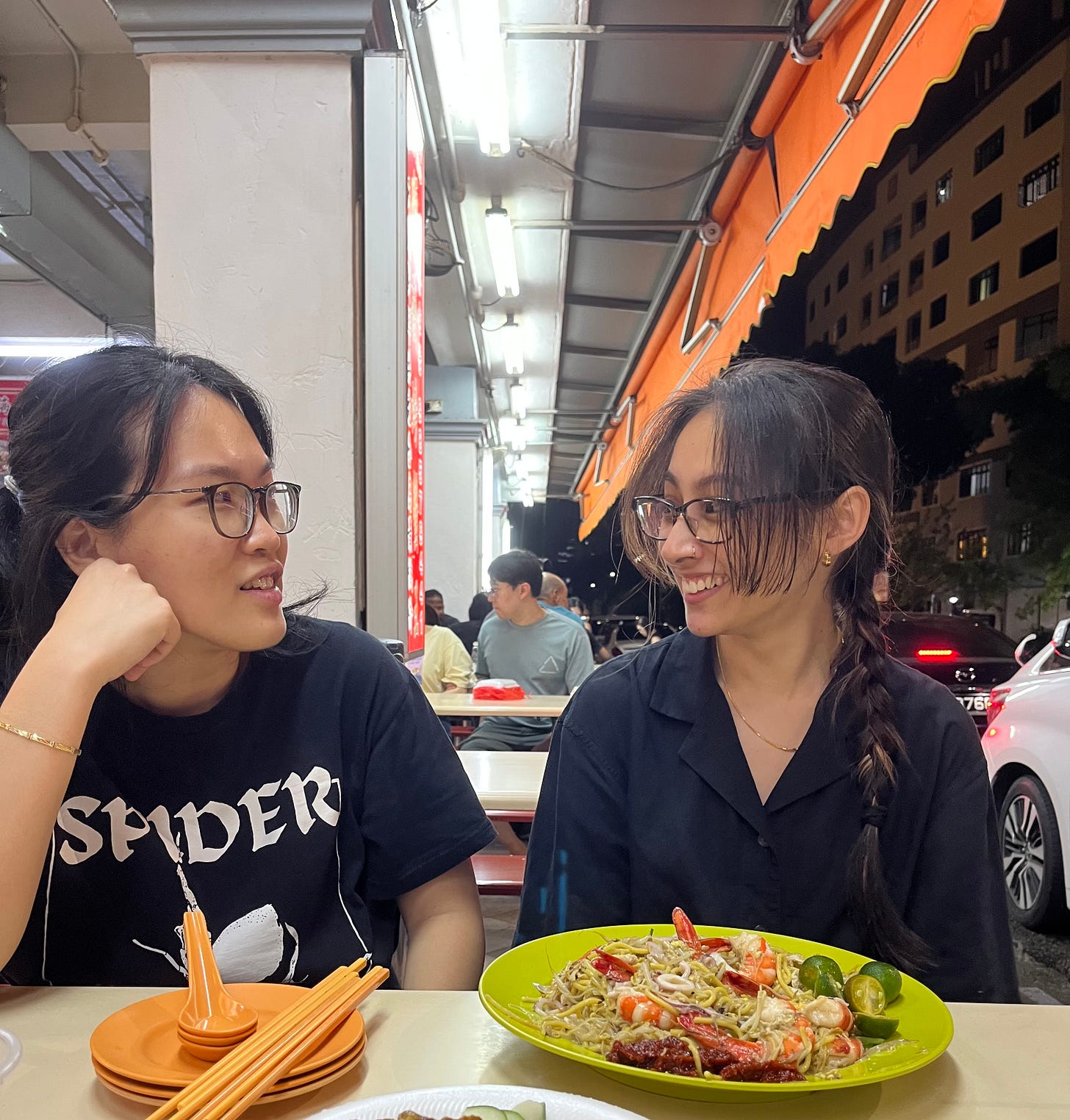Hi everyone,
2024 has been a huge year for us here at Mynah. We came out of hiatus, launched this newsletter, started our trivia league, and premiered our first podcast episode. We’re also working, behind the scenes, on Issue 5 of our print magazine. 2025 is going to be our most active year yet, we’re really looking forward to sharing more of those plans with you in the coming months.
One of my (Ruby) favourite things about December is SUSPECT’s Book of the Year list, where the journal invites Singaporean writers, artists, and thinkers to recommend their best reads from the year. I’ve contributed to this list for few years and it’s always a great time for me to reflect on my reading diet and what I care about in good writing. I also love reading everybody’s recommendations. Singapore doesn’t have a robust criticism scene so there aren’t many public conversations about books besides in the Straits Times’ growing books section and on social media.
Here’s my submission for 2024:
I spent 2024 thinking about the artist as a body in space – not as intellect or a pair of skilled hands but as someone who needs to be fed, clothed, and housed. Cher Tan’s Peripathetic: Notes on (un)belonging (NewSouth Publishing, 2024) opens with a discussion of ‘meatspace’ and the Internet’s decorporealised promise of fantasy, setting the reader up for the book’s critical conversations about the realities of artistic production in the 21st century. I appreciate how Cher eschews abstraction to focus on granular practical details like how downloading critical theory from file-sharing websites and delivering food for $8 a trip made the work of writing possible.
Similarly, I felt the burden of being a body when reading Hai Fan’s Delicious Hunger (Tilted Axis Press, 2024). One story, “Hillside Rain”, describes the Sisyphean tedium of tilling loamy riverbank soil to grow crops, an essential task for the Magong members subsisting on the rainforest. I would not have been able to read Delicious Hunger if not for Jeremy Tiang’s translation from the Chinese, artistic labour for which I am grateful.
I must also mention the most important work of art I encountered this year, filmmaker Jason Soo’s Al Awda (2024). The documentary follows an international group of activists on a mission to end the unjust Israeli blockade of Gaza during 2018’s Freedom Flotilla Mission. Jason recounts how he stopped rolling when the Israeli navy boarded Al Awda, assembling the final cut using footage shot by other activists until they were arrested and whatever had not been confiscated. Dr Ang Swee Chai, a Singaporean doctor in exile, was part of the mission and brutalised while in detention. The film is literally about bodies on the line. All three works are by and about people on Singapore’s margins, which is perhaps why their political stakes are so well-articulated.
If you’re interested in reading more about Al Awda, Karen shared her reflections in last week’s Mynah newsletter. You can read the rest of the SUSPECT’s Book of the Year list here.
For this edition of the newsletter, I asked the Mynah team and a few of our friends for their recommendations too.
Yu-Mei Balasingamchow, author
Yu-Mei was a contributor to the very first issue of Mynah in 2016. Her debut novel, Names Have Been Changed, will be out in 2026. It’s about a Singaporean fugitive on the run around the world. I read an early draft and absolutely loved it.
James by Percival Everett — a reclaiming of Twain’s character and so much more, a page-turner and also a deep, dark look at human nature.
Abyss by Pilar Quintana, translated by Lisa Dillman — who knew that a story told from an 8-year-old’s POV could be so psychologically intense!
My Friends by Hisham Matar — gorgeous prose, a loving portrayal of male friendship, and I’m always drawn to stories of exile, external and internal.
Jeremy Tiang, literary translator, novelist and playwright
Jeremy was in conversation with fellow Singaporean writer and translator Amanda Lee Koe in Issue 3. He translated Hai Fan’s Delicious Hunger, a book of short stories inspired by Hai Fan’s time in the rainforest as a Malayan Communist Party guerrilla. It’s also one of my books of the year. The Singapore edition will be published by Ethos Books early next year.
Taiwan Travelogue by Yáng Shuāng-zǐ, translated by Lin King — a story of queer yearning in colonial-era Taiwan asking if the coloniser and the colonised can ever have any kind of relationship.
Enter Ghost by Isabella Hammad — the process of staging Hamlet in the West Bank reveals the daily struggle and cruelty of life under occupation.
Darren Wan, Mynah editor
What Is Mine by José Henrique Bortoluci, translated by Rahul Bery — a memoir of a truck driver who worked on mega-projects in the Amazon that critically examines economic development in Brazil since the 1960s.
Isabelle Lim, Mynah editor
Material World: A Substantial Story of Our Past and Future/The Six Raw Materials That Shape Modern Civilization by Ed Conway. This was published in late 2023 but the publisher changed the subtitle of the book to make it sexier (raw materials, major turn-off) and pushed it more in 2024 hahaha. But this is an actually educational book about commodities and supply chains with incredible on the ground reporting (he visits multiple mines, factories across the globe and talks you through otherwise incredibly dry manufacturing processes with quite lively prose and covers a vast expanse of time going way back to colonial exploitation of resources). It covers sand, salt, iron, oil, copper, and lithium and has extraordinary nuggets of information that will make you gasp at the fragility of the commodity structure that undergirds the modern economy - stuff like how there is literally one single place on earth in North Carolina that has pure enough quartz to make the silicon wafers that go into chips and without it NONE of the technology we’re surrounded by would work.
I think my fiction recommendation is an old one: Marilynne Robinson's Housekeeping. It's been on my reading list for a long long long time and after reading it I can see why it's been a mainstay of reading lists. It's a careful depiction of rural American life. The book was slow to begin but gathered a kind of aesthetic whirlwind as it progressed — the strength of its writing was remarkable. I don't think you get very many contemporary authors where you can luxuriate in their prose the way that you can do with Robinson? I highlighted several pages of descriptive writing that will make you stop and gasp.
Have we mentioned the Mynah podcast yet?
Everybody who’s listened to the episode loves the extended hokkien mee discussion. Our guest, Jialiang, treated us to a deep dive on Swee Guan’s artistry.
Look where we ended up today! (It’s also why the newsletter is so late today, I was preoccupied.)
It was beautiful.
We’re recording our third episode in a week’s time with a guest we’re very pleased to have on the show.
If you have thoughts on the podcast, the newsletter, hokkien mee, or your books of the year, feel free to drop us a comment, reply to this email, or hit us up on Instagram. We’d love to chat!





